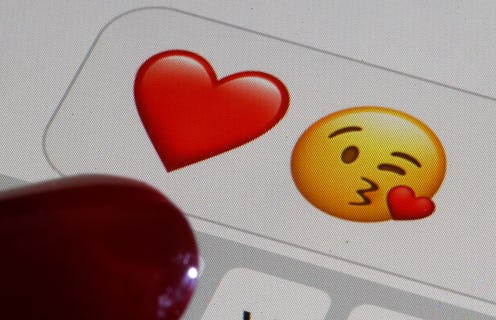Life
What Emojis Say About Your Personality

It’s probably safe to assume that your use of a grinning-face emoji means you’re happy, and that a winking-face emoji means you’re, you know, winking, but what if the way you use emoji reveals more about you? Psychologists are studying what emoji use says about your personality and how emoji impact human interaction. Communicating via smiley cartoon faces and red flamenco dancers may seem silly at times, but these symbols are important factors in how people interact, especially as more and more people take to social media and other platforms of digital communication.
Emoji play a much-needed role in text-based communication. If you’ve ever had an online conversation filled with misunderstandings— with sarcasm mistaken for seriousness, or a sympathetic statement taken as judgmental — you know how dangerous it can be to communicate without the context provided by facial expressions, voice inflections, or gestures. Emoji help to fill some of the gaps. “We mostly use emojis like gestures, as a way of enhancing emotional expressions,” cyberpsychologist Linda Kaye explained in a press release. “There are a lot of idiosyncrasies in how we gesture, and emojis are similar to that, especially because of the discrepancies as to how and why we use them.”
To delve further into how people use emoji, Kaye and psychologists Stephanie Malone and Helen Wall conducted two related studies, published in Computers in Human Behavior and Trends in Cognitive Sciences. In the first study, participants provided information about their personalities and their use of emoji; later they engaged in Facebook conversations with strangers. The researchers used this data to analyze how self-reported emoji use reflects personality traits and how people’s use of emoji impacts others' perceptions of them.
The researchers found that people who tend to use a lot of emoji also tend to have agreeable personalities. “If you look at personality traits, like agreeableness, how amenable you are to other people, it seems to be related to whether you use emojis or not,” Kaye said in the press release. When participants gave their impressions of other test subjects based on their Facebook conversations, the researchers found that they tended to perceive participants who used a lot of “happy” emoji as agreeable, conscientious, and approachable.
The study also revealed that people with higher degrees of self-awareness tended to temper their use of “sad” emoji. “We found that self-presentation was negatively related to using sad emojis,” Kaye told CNN. “The more people are self-aware, the less they use these emojis.”
Emoji may be associated with tech-obsessed young people, but they are becoming increasingly used by people across ages and in a variety of contexts. Although emoji are undoubtedly helpful in conveying emotional tone in digital conversations, they have created a new social etiquette of their own, with its own complexities and pitfalls. “People are making judgments about us based on how we use emojis, and they're not necessarily accurate,” Kaye remarked. “What we need to be aware of is that those judgments might differ depending on where or with whom you’re using those emojis, such as in the workplace or between family members.”
As long as digital communication continues to grow and change, it’s safe to assume that some version of emoji will stay in use. Further study of how they affect communication and perception will be essential as these emotional signifiers evolve over time.